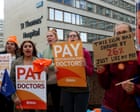
In recent developments within the UK, essential discussions are underway regarding both the medical field and online safety regulations. These situations offer a chance for reflection and an opportunity to engage positively with transformative change.
Beginning with the healthcare sector, tensions have been rising as resident doctors in the UK prepare for a significant five-day strike. This industrial action emerges amid ongoing disputes related to pay and working conditions, leading to a complex situation where public support has notably diminished. The health secretary, Wes Streeting, has taken a step towards conciliatory dialogue by planning to meet with representatives from the British Medical Association. His aim is to forestall what has been described as “unnecessary and unfair strikes.” Despite previous assertions that characterized the planned action as “completely unreasonable,” Streeting’s move signals a willingness to engage with the nuances of the issue and strive for a resolution that aligns with the needs of both healthcare professionals and the wider public.
As the situation unfolds, the focus remains on how productive conversations can lead to mutual understanding and progress. The anticipation of upcoming discussions between the health secretary and the BMA brings with it a hopeful outlook for an amicable settlement that respects the hard work of resident doctors while ensuring the continued provision of quality healthcare services.
Transitioning to matters of online safety, notable advancements are being made to protect children from potentially harmful content on the internet. Ofcom, the UK’s chief media regulator, has introduced stringent age verification checks as part of its overarching strategy to safeguard children online. Described by Melanie Dawes as a “really big moment,” these rules are set to transform the landscape of online safety, mandating ever-greater accountability from major tech companies.
The new age verification measures have garnered attention and mixed reactions from various stakeholders. While they are praised by some as a pivotal move towards enhanced safety for younger users, certain campaigners express a desire for even more rigorous measures against technology giants. Nevertheless, this initiative underscores Ofcom’s dedicated efforts to balance the expansive nature of the internet with the necessity of a secure digital environment for vulnerable users.
The introduction of these checks exemplifies an encouraging step in the ongoing journey to harmonize advancement in technology with ethical responsibility. As these regulations are rolled out later this month, there is a collective anticipation for a more secure online environment that can effectively shield children from inappropriate content.
Both of these issues highlight the intersection between policy, public service, and community welfare. They serve as reminders of the ever-evolving challenges and opportunities that accompany change. Whether in the field of healthcare or digital safety, the common thread is a commitment to nurturing environments that prioritize the well-being and safety of all individuals.
Through calm and constructive dialogues, there is immense potential for positive outcomes and solutions that serve the collective good. These ongoing discussions and initiatives provide an opportunity to reflect on what it means to support public services and protect the most vulnerable in society. By embracing a measured and thoughtful approach to these matters, there is hope for creating a society that prioritizes health, safety, and compassion at its core.
Source: {link}
